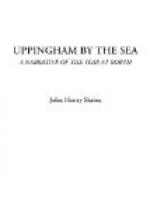But we took a more solemn farewell on the morrow, the 10th of April. The parts were reversed now, and we were the spectators. Just at sundown of a day of clear spring weather, the school was gathered at their doors watching a long procession of villagers advancing up the street towards them. We had heard whispers in the morning of a “demonstration,” and now it was come. Through the dust we caught sight of banners flying at the head of the column; under them marched the choir of children singing, and behind them the whole village was a-foot. The people of Borth, of every age and degree, from the first householders and yeomen of the place to the fishermen’s boys and girls, had come to wish us God speed. Reaching the school quarters they halted, the boys lining the roadway on each side of them, and filling the broad flight of steps before the hotel doors. When the cheers for “Uppingham” and our answering cheers for “Borth” had rung out across the sands to seaward, there was an interval, filled up with songs by the children, while they waited the arrival of the spokesmen, whom they had charged with their valediction. When these arrived, a deputation of the villagers moved into the school-room shed, and there presented a brief address, which ran thus: “We, the inhabitants of Borth, beg to tender our most sincere thanks to Dr. Thring, and all the masters and scholars of the celebrated Uppingham School, for the very many generous acts and kindly feelings exhibited to us during their sojourn here.” The address was introduced and explained by speeches marked by refined feeling, and delivered with a noticeable grace of manner. We will here cite, though for another reason, a few words of the speaker who moved the address; he commented on the discipline which (from the evidence of their conduct when at large) seemed to rule the school; naively but pointedly he noted that no offence had ever been given; “No boy had laughed at the villagers, if they were old and queer-looking or queerly dressed; there had been no disorder, no shabby act, nothing undecent” (so he put it in his unpractised English) “during the whole twelve months we had spent among them.” We give his testimony without note or comment, sure that the facts would not be better told in words less simple. They were little things he witnessed to; was it a little thing that the witness could be truly borne?
The boys were not present to hear the speeches, but they will like well to remember the scene without doors at that unlooked-for reunion of school and village. It was a scene made up of homely elements enough, but somehow, in our own memory at least, few pictures will remain printed in such fast colours. Clearly, as on that evening, we shall always see, distinct in the quiet light of the afterglow, the ranks of serious faces, touched and stilled by the surprise of a contagious sympathy, as English boys and Welsh cottagers looked each other in the face, and felt, if for the space of a few heartbeats only, an outflash of that ancient kinship which binds man and man together more than race and circumstance divide.




